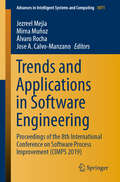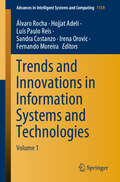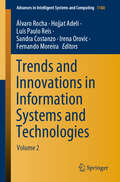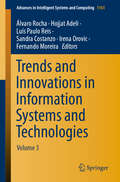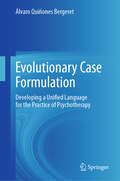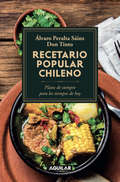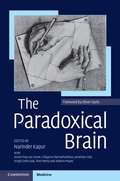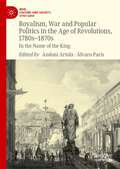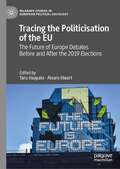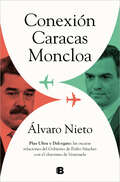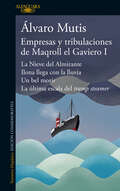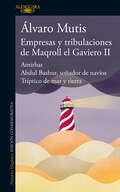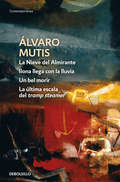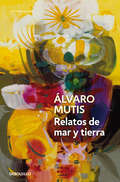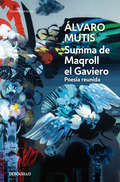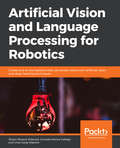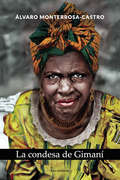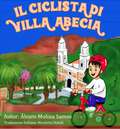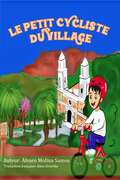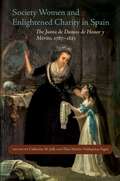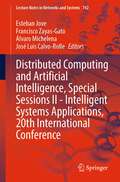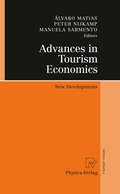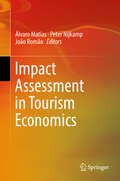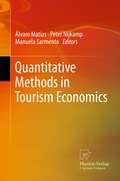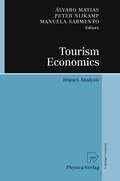- Table View
- List View
Trends and Applications in Software Engineering: Proceedings of the 8th International Conference on Software Process Improvement (CIMPS 2019) (Advances in Intelligent Systems and Computing #1071)
by Jezreel Mejia Álvaro Rocha Mirna Muñoz Jose A. Calvo-ManzanoThis book contains a selection of papers from The 2019 International Conference on Software Process Improvement (CIMPS’19), held between the 23th and 25th of October in León, Guanajuato, México. The CIMPS’19 is a global forum for researchers and practitioners that present and discuss the most recent innovations, trends, results, experiences and concerns in the several perspectives of Software Engineering with clear relationship but not limited to software processes, Security in Information and Communication Technology and Data Analysis Field.The main topics covered are: Organizational Models, Standards and Methodologies, Software Process Improvement, Knowledge Management, Software Systems, Applications and Tools, Information and Communication Technologies and Processes in non-software domains (Mining, automotive, aerospace, business, health care, manufacturing, etc.) with a demonstrated relationship to Software Engineering Challenges.
Trends and Innovations in Information Systems and Technologies: Volume 1 (Advances in Intelligent Systems and Computing #1159)
by Irena Orovic Hojjat Adeli Álvaro Rocha Luís Paulo Reis Sandra Costanzo Fernando MoreiraThis book gathers selected papers presented at the 2020 World Conference on Information Systems and Technologies (WorldCIST’20), held in Budva, Montenegro, from April 7 to 10, 2020. WorldCIST provides a global forum for researchers and practitioners to present and discuss recent results and innovations, current trends, professional experiences with and challenges regarding various aspects of modern information systems and technologies. The main topics covered are A) Information and Knowledge Management; B) Organizational Models and Information Systems; C) Software and Systems Modeling; D) Software Systems, Architectures, Applications and Tools; E) Multimedia Systems and Applications; F) Computer Networks, Mobility and Pervasive Systems; G) Intelligent and Decision Support Systems; H) Big Data Analytics and Applications; I) Human–Computer Interaction; J) Ethics, Computers & Security; K) Health Informatics; L) Information Technologies in Education; M) Information Technologies in Radiocommunications; and N) Technologies for Biomedical Applications.
Trends and Innovations in Information Systems and Technologies: Volume 2 (Advances in Intelligent Systems and Computing #1160)
by Irena Orovic Hojjat Adeli Álvaro Rocha Luís Paulo Reis Sandra Costanzo Fernando MoreiraThis book gathers selected papers presented at the 2020 World Conference on Information Systems and Technologies (WorldCIST’20), held in Budva, Montenegro, from April 7 to 10, 2020. WorldCIST provides a global forum for researchers and practitioners to present and discuss recent results and innovations, current trends, professional experiences with and challenges regarding various aspects of modern information systems and technologies. The main topics covered are A) Information and Knowledge Management; B) Organizational Models and Information Systems; C) Software and Systems Modeling; D) Software Systems, Architectures, Applications and Tools; E) Multimedia Systems and Applications; F) Computer Networks, Mobility and Pervasive Systems; G) Intelligent and Decision Support Systems; H) Big Data Analytics and Applications; I) Human–Computer Interaction; J) Ethics, Computers & Security; K) Health Informatics; L) Information Technologies in Education; M) Information Technologies in Radiocommunications; and N) Technologies for Biomedical Applications.
Trends and Innovations in Information Systems and Technologies: Volume 3 (Advances in Intelligent Systems and Computing #1161)
by Irena Orovic Hojjat Adeli Álvaro Rocha Luís Paulo Reis Sandra Costanzo Fernando MoreiraThis book gathers selected papers presented at the 2020 World Conference on Information Systems and Technologies (WorldCIST’20), held in Budva, Montenegro, from April 7 to 10, 2020.WorldCIST provides a global forum for researchers and practitioners to present and discuss recent results and innovations, current trends, professional experiences with and challenges regarding various aspects of modern information systems and technologies.The main topics covered are A) Information and Knowledge Management; B) Organizational Models and Information Systems; C) Software and Systems Modeling; D) Software Systems, Architectures, Applications and Tools; E) Multimedia Systems and Applications; F) Computer Networks, Mobility and Pervasive Systems; G) Intelligent and Decision Support Systems; H) Big Data Analytics and Applications; I) Human–Computer Interaction; J) Ethics, Computers & Security; K) Health Informatics; L) Information Technologies in Education; M) Information Technologies in Radiocommunications; and N) Technologies for Biomedical Applications.
Evolutionary Case Formulation: Developing a Unified Language for the Practice of Psychotherapy
by Álvaro Quiñones BergeretThis book presents the Evolutionary Case Formulation model, a new proposal of case formulation protocol developed with the aim of providing psychotherapists with a common language to identify and treat psychological problems of varying complexity. This new case formulation model was developed based on the analysis of textual data in complete psychotherapeutic processes which led to the identification of different dimensions of intersubjective meaning elaboration that are a product of our evolution as a species. The Evolutionary Case Formulation model is based on a system of first and second order intersubjective knowledge domains. The first order knowledge domain is the Self System, which is ubiquitous in the processing of information and creation of individual meaning in a cultural intersubjective matrix. The second order knowledge domains are the different dimensions of intersubjective meaning elaboration: Cognition, Emotion, Interpersonal, Imagination, Corporeality, Sexuality and Religiosity/Spirituality. This system provides psychotherapists with a new conceptual framework to work with patients in the different stages of the psychotherapeutic process, from assessment to treatment planning and implementation. The book Evolutionary Case Formulation: Developing a Unified Language for the Practice of Psychotherapy, that the reader has in their hands, was first published in Spanish in 2021. This English edition is a fully revised and updated version of the original Spanish edition. More specifically, the case formulation protocol presents a series of innovations that are not present in the Spanish edition. In other words, it is a protocol that includes numerous clarifications in the intersubjective knowledge domains, making this book different. The original manuscript of this book was written in Spanish and translated into English with the help of artificial intelligence. The author (with the friendly support of a bilingual psychotherapist) has subsequently revised the text further in an endeavor to refine the work stylistically.
Recetario popular chileno
by Álvaro Peralta (Don Tinto)Platos de siempre para los tiempos de hoy. Hay platos que todos conocemos o recordamos, tan típicamente chilenos que no pueden faltar en los recuerdos familiares, en reuniones de comensales con un buen trago o en las visitas a restaurantes con amigos extranjeros. Pero ¿sabemos de dónde viene?, y lo que es más importante: ¿conocemos como hacerlos? Álvaro Peralta, Don Tinto, destacado cronista gastronómico, ha dedicado gran parte de su labor a investigar y rescatar la comida tradicional. Periodista, además de buen cocinero, no solo ha escudriñado el anecdotario y los recetas de los platos infaltables del recetario popular chileno, sino que además, él mismo se ha encargado de recopilar y probar de su propia mano, la preparación del pastel de papas, del ajiaco, las pantrucas, el charquicán o el pernil, adaptándolas además a los tiempos que corren. Del causeo o la pichanga, a la lengua, la plateada o su buena carbonada, todo acompañado de un pichuncho, un pisco sour o la inevitable piscola. Pase y sírvase.
The Paradoxical Brain
by Oliver Sacks Álvaro Pascual-Leone Tom Manly Andrew Mayes Jonathan Cole Sergio Della Sala Narinder Kapur Vilayanur RamachandranThe Paradoxical Brain focuses on a range of phenomena in clinical and cognitive neuroscience that are counter-intuitive and go against the grain of established thinking. The book covers a wide range of topics by leading researchers, including: * Superior performance after brain lesions or sensory loss * Return to normal function after a second brain lesion in neurological conditions * Paradoxical phenomena associated with human development * Examples where having one disease appears to prevent the occurrence of another disease * Situations where drugs with adverse effects on brain functioning may have beneficial effects in certain situations A better understanding of these interactions will lead to a better understanding of brain function and to the introduction of new therapeutic strategies. The book will be of interest to those working at the interface of brain and behaviour, including neuropsychologists, neurologists, psychiatrists and neuroscientists.
Royalism, War and Popular Politics in the Age of Revolutions, 1780s-1870s: In the Name of the King (War, Culture and Society, 1750–1850)
by Andoni Artola Álvaro ParísThis book offers a ground-breaking approach to royalism and popular politics in Europe and the Americas during the Age of Revolutions. It shows how royalist and counterrevolutionary movements did not propose a mere return to the past, but rather introduced an innovative way of addressing the demands and expectations of various social groups. Ordinary people were involved in the war and adapted the traditional imaginary of the monarchy to craft new models of political participation. This edited collection brings together scholars from France, Spain, Norway, and Mexico, to provide a transatlantic comparative perspective. It is a must-read for scholars and students looking to discover the lesser-known side of the Age of Revolutions, and the motivations of those who fought in the name of the king.
Tracing the Politicisation of the EU: The Future of Europe Debates Before and After the 2019 Elections (Palgrave Studies in European Political Sociology)
by Taru Haapala Álvaro OleartDeparting from the idea that political controversies are embedded in the very framework of European integration, this volume focuses on the relationship between politicisation and European democracy. The contributors to this edited volume trace the various ways of understanding ‘politicisation’ before and beyond the 2019 European elections. The aim is to offer constructive reinterpretations of the concept for further research in the field. Encompassing different approaches, the book shows a plurality of perspectives and provides innovative analytical tools to make sense of the phenomenon of politicisation in the EU context. Assuming that EU politicisation can be seen both as vice and virtue depending on the way in which it takes place, the authors analyse under what conditions it has a positive or negative influence over European democracy. Emphasising that scholars ought to be aware of the normative assumptions underlying the conceptualisation of politicisation, the book illustrates how many of the features in European politics that were intensified during the Covid-19 pandemic were already present earlier. Tracing the Politicisation of the EU will be of interest to students and scholars in EU Studies, Comparative Politics, Media and Communication, Political Theory and Political Sociology.
Conexión Caracas-Moncloa: Plus Ultra y Delcygate: las oscuras relaciones del Gobierno de Pedro Sánchez con el chavismo de Venezuela
by Álvaro NietoConexión Caracas-Moncloa es un libro trepidante que nos abre las puertas a las intrigas de las más altas esferas del poder, exponiendo una política de componendas, traiciones y mentiras. ¿Qué relaciones existen entre el Gobierno de Pedro Sánchez y el chavismo de Venezuela? ¿Por qué el entonces ministro José Luis Ábalos se reunió en Barajas con la vicepresidenta de Venezuela pese a la prohibición de entrada en la Unión Europea? ¿Y por qué el Gobierno de coalición quiso salvar una aerolínea como Plus Ultra cuyos vínculos con el chavismo eran incuestionables? Los dos principales escándalos del Gobierno de Pedro Sánchez, el Delcygate -el día en que Delcy Rodríguez, la número dos de Maduro, aterrizó en España- y el Plus Ultra -el rescate millonario a esta aerolínea-, tienen en común mucho más que los aviones que los protagonizan. En ambos juega un papel determinante Venezuela, dejando al descubierto las históricas y controvertidas relaciones entre el régimen chavista y los dos partidos que integran el Ejecutivo español, PSOE y Podemos. Álvaro Nieto, el periodista que lideró el equipo que destapó ambos escándalos, cuenta en este libro todos los detalles sobre cómo se gestaron, sus extraños vínculos y las consecuencias que podrían tener para algunos miembros del Gobierno.
Empresas y tribulaciones de Maqroll el Gaviero I
by Álvaro Mutis Jaramillo"Mutis inventa a Maqroll el Gaviero como García Márquez a Macondo, Onetti a Santa María, Rulfo a Comala. Maqroll es también una región de lo imaginario". Mario Benedetti En este primer volumen que reúne la apasionante trayectoria del personaje emblemático de Álvaro Mutis, Maqroll el Gaviero emprende, en La Nieve del Almirante, un desesperado viaje corriente arriba por las aguas del río Xurandó, en el que, bajo un sol inclemente y a merced de la enfermedad, recorrerá, náufrago, el camino hacia el verdadero sentido de una existencia que no es sino para el riesgo. Lo encontramos de nuevo en Ilona llega con la lluvia, a bordo del Hansa Stern con rumbo a Panamá, donde se convertirá en un marinero en tierra obligado por los brazos de Ilona, hasta que otra mujer, Larissa, le señale nuevos viajes. "La muerte transforma la vida en destino", que decía Malraux, parece ser la máxima que rige las andanzas del Gaviero en Un bel morir, pero, a pesar de verse involucrado en una historia de contrabando y tragedia, sobrevivirá para embarcarse, en La última escala del Tramp Steamer, en un viejo y destartalado carguero que recoge cualquier mercancía en cualquier puerto con tal de continuar el viaje: una hermosa metáfora sobre los amores transitorios e imposibles que terminará, como no podía ser de otro modo, en naufragio. Prólogo de Juan Esteban Constaín
Empresas y tribulaciones de Maqroll el Gaviero II
by Álvaro Mutis Jaramillo"La obra completa de Álvaro, su vida misma, son las de un vidente que sabe a ciencia cierta que nunca volveremos a encontrar el paraíso perdido". Gabriel García Márquez Este segundo volumen que recoge las venturas y desventuras de Maqroll el Gaviero inicia con Amirbar, que recibe su título de una mina situada en un lugar recóndito de la cordillera colombiana, llamada así por el quejido que el aire produce al entrar en sus grutas. El Gaviero ha abandonado los mares para buscar allí fortuna, pero no encuentra nada más que soledad, ansiedad y delirio. El silbido del viento le trae la llamada del mar, que lo reclama como una más de sus criaturas. En Abdul Bashur, soñador de navíos abandonamos por un momento a Maqroll para conocer al amigo fiel con el que comparte, del Caribe al Mediterráneo, sus empresas y viajes. El marino libanés tiene un anhelo: encontrar el barco ideal, y en esta búsqueda imposible llegará al cumplimiento de su fatal destino. Tríptico de mar y tierra es el broche con el que Mutis cierra el ciclo dedicado a las andanzas de Maqroll. En él se concentran tres narraciones breves, sendas experiencias en la vida del Gaviero que le revelaron regiones del alma hasta entonces para él desconocidas y en las que, muy a su pesar, o a pesar de sí mismo, había estado navegando sin saberlo
Empresas y tribulaciones de Maqroll el Gaviero: La Nieve del Almirante | Ilona llega con la lluvia | Un bel morir | La última escala del tramp steamer (Empresas y tribulaciones de Maqroll el Gaviero #1)
by Álvaro Mutis<P>Maqroll el Gaviero emprende en La Nieve del Almirante (1986) un desesperado viaje corriente arriba por las aguas del río Xurandó, en el que, bajo un sol inclemente y a merced de la enfermedad, recorrerá, náufrago, el camino hacia el verdadero sentido de una existencia que no es sino para el riesgo. <P>Le encontramos de nuevo en Ilona llega con la lluvia (1988), a bordo del Hansa Stens con rumbo a Panamá, donde se convertirá en un marinero en tierra obligado por los brazos de Ilona hasta que otra mujer, Larissa, le señale nuevos viajes. <P>«La muerte transforma la vida en destino», que decía Malraux, parece ser la máxima que rige las andanzas del Gaviero en Un bel morir (1989), pero, a pesar de verse involucrado en una historia de contrabando y tragedia, sobrevivirá para embarcarse en La última escala del tramp steamer (1988), en un viejo y destartalado carguero que recoge cualquier mercancía en cualquier puerto con tal de continuar viaje, una hermosa metáfora sobre los amores transitorios e imposible que terminará, como no podía ser de otro modo, en naufragio.
Relatos de mar y tierra
by Álvaro MutisNadie como Álvaro Mutis ha conjugado tan genuinamente en prosa la infusión de vida, el dandismo, la precisión intelectual y los más oscuros sabores de la lírica. El autor, se inició en la narrativa breve, que presentamos reunida en este volumen, con Diario de Lecumberri, donde tamiza -hasta convertirlas en una ficción desolada pero luminosa sobre la condición humana- sus experiencias en la cárcel mexicana conocida como «Palacio Negro». En La mansión de Araucaíma sugiere un drama gótico en una hacienda cuyos habitantes se desenmascaran al ritmo de una prosa sensual y feroz. Con los relatos finales de La muerte del estratega, el autor colombiano traza sus conjeturas sobre la condición simultánea de la vida y la muerte, mientras que en Los textos de Alvar de Mattos, así como en los Intermedios, nos regala una serie de juegos lúcidos sobre las hebras de la Historia. El libro se cierra con Un rey mago en Pollensa, relato inédito en el que Mutis evoca, a modo de epílogo vital y literario, un episodio perdido de Maqroll el Gaviero.
Summa de Maqroll el Gaviero
by Álvaro MutisEn Maqroll el Gaviero, «esta especie de otro yo que escribe mis cosas», habita la obra poética de Álvaro Mutis. <P><P>Por los poemas que presentamos yerra su carácter fabuloso, el torrente de lo vivo y lo imaginario, la voz que canta al viaje, que recrea las batallas y las vidas de otros hombres, que recoge los vestigios del amor, que zarpa a la muerte, una voz casi ancestral que celebra la maravilla perdida. <P><P>Liberados de ataduras formales y de género, los versos de Álvaro Mutis dan fe del inesperado prodigio que obran las palabras, como apunta el poema que cierra el volumen, en manos de «infatuados tribunos ávidos de un poder hecho de sombra y desventura.»
Artificial Vision and Language Processing for Robotics: Create end-to-end systems that can power robots with artificial vision and deep learning techniques
by Álvaro Morena Alberola Gonzalo Molina Gallego Unai Garay MaestreCreate end-to-end systems that can power robots with artificial vision and deep learning techniquesKey FeaturesStudy ROS, the main development framework for robotics, in detailLearn all about convolutional neural networks, recurrent neural networks, and roboticsCreate a chatbot to interact with the robotBook DescriptionArtificial Vision and Language Processing for Robotics begins by discussing the theory behind robots. You'll compare different methods used to work with robots and explore computer vision, its algorithms, and limits. You'll then learn how to control the robot with natural language processing commands. You'll study Word2Vec and GloVe embedding techniques, non-numeric data, recurrent neural network (RNNs), and their advanced models. You'll create a simple Word2Vec model with Keras, as well as build a convolutional neural network (CNN) and improve it with data augmentation and transfer learning. You'll study the ROS and build a conversational agent to manage your robot. You'll also integrate your agent with the ROS and convert an image to text and text to speech. You'll learn to build an object recognition system using a video.By the end of this book, you'll have the skills you need to build a functional application that can integrate with a ROS to extract useful information about your environment.What you will learnExplore the ROS and build a basic robotic systemUnderstand the architecture of neural networksIdentify conversation intents with NLP techniquesLearn and use the embedding with Word2Vec and GloVeBuild a basic CNN and improve it using generative modelsUse deep learning to implement artificial intelligence(AI)and object recognitionDevelop a simple object recognition system using CNNsIntegrate AI with ROS to enable your robot to recognize objectsWho this book is forArtificial Vision and Language Processing for Robotics is for robotics engineers who want to learn how to integrate computer vision and deep learning techniques to create complete robotic systems. It will prove beneficial to you if you have working knowledge of Python and a background in deep learning. Knowledge of the ROS is a plus.
La condesa de Gimaní
by Álvaro Monterrosa-Castro¿Qué deseas que la condesa de Gimaní te cuente de un reinado estudiantil que es forever? Señor forastero que viene a preguntar, soy Rosalía, nombre de origen latino que significa: rosa pequeña. Soy la condesa de Gimaní. Se escribe Gimaní y se pronuncia «Yiiiiiiimaní», como si fueran un poco de letras «iiiiiii» pegaditas y en vez de «Gi», es «Yi», la más ilustrada del palacio real de su Majestad Paola Matilde I. Conozco todos los detalles de ese reinado, puedo hablarle de la tarde enque cayó un aguacero de flores, de cómo eran los carruajes y las carretas de colores de su Majestad, de la suntuosa ceremonia de proclamación y coronación, bajo los fuegos artificiales de Miguel Ángel y José Ignacio. Pregúnteme sobre las Musas que se desprendieron del frontispicio del Teatro Rialto de los Mares, para hacerle genuflexión a mi Reina que es su Reina. Puedo explicarle detalles del palacio real de la calle Segunda de Zapatillo ydel castillo campestre de Aryona. De una fuga secreta de amor hacia los Gigantes del Santo Espíritu de la Bondad y de todo lo que derivó. Venga usted, pregunte no más, que yo soy la única que todo le puedo contar.Y Recuerde, soy Rosalía, la Condesa de Gimaní.
Il Ciclista di Villa Abecia: Traduzione Italiana: Nicoletta Natoli ("Il Ciclista di Villa Abecia" #1)
by Álvaro Molina SamosIn un paesino bello e pittoresco, un bambino di umili origini riceve in regalo una bicicletta da un bambino di città di nome Marcelito, con cui instaura un'amicizia sincera e tenera, che durerà per sempre. A partire da quel momento usa la bici ogni giorno per tutte le sue attività, diventando "Il ciclista di Villa Abecia", e motivando così i piccoli lettori a usarla. Con il patrocinio di Marcelito e della sua famiglia, “Il ciclista di Villa Abecia”, si reca in città per una gara di bicicross, dove ha l'opportunità di dimostrare i suoi valori di fedeltà, gratitudine e amicizia. Soltanto alcuni dei valori che questo bel libro inculca nei suoi lettori. Ogni pagina è illustrata. Il libro ha una sezione interattiva, che permette ai lettori di scrivere e illustrare il loro finale; inoltre, contiene un glossario di valori e parole usati nel libro, rafforzati da una ricerca di parole e un cruciverba, per invitare i piccoli lettori a riflettere e a interiorizzare questi principi morali per le loro vite. Infine, presenta una sezione delle immagini del libro da colorare per far divertire i piccoli lettori. In definitiva, si tratta di un racconto bello, ben illustrato ed educativo per i bambini, che non può mancare nella collezione privata dei vostri figli.
Le petit cycliste du village
by Álvaro Molina SamosDans un joli petit village, un garçon de milieu modeste reçoit une bicyclette en cadeau, de la part d’un jeune citadin nommé Marcelito, avec lequel il noue une amitié sincère et attachante. Il utilise alors la bicyclette pour toutes ses activités quotidiennes, devenant ainsi « le petit cycliste du village ». Grâce à Marcelito et à sa famille, « le petit cycliste du village » se rend à la capitale pour une course de BMX. Lors de cette compétition, il fait preuve de fidélité, de gratitude et de sincérité. Ce ne sont là que quelques-unes des valeurs que ce beau livre inculque à ses lecteurs. Chaque page est illustrée. Le livre comporte une section interactive, permettant d’écrire et d’illustrer sa propre fin, un glossaire des valeurs et des mots utilisés dans le livre, ainsi que des mots-cachés et une grille de mots croisés, pour inviter les jeunes lecteurs à réfléchir et à intégrer ces principes moraux. Enfin, il comporte une section d’images tirées du livre, à colorier. Une belle histoire pour les plus jeunes, bien illustrée et éducative.
Society Women and Enlightened Charity in Spain: The Junta de Damas de Honor y Mérito, 1787–1823 (New Hispanisms: Cultural and Literary Studies)
by Anne J. Cruz Elizabeth Franklin Lewis Mónica Bolufer Peruga Mónica Burguera López Gloria Espigado Tocino Paloma Fernández Quintanilla Gloria Franco Rubio María Victoria Cortezo Josefina Méndez Vázquez Álvaro MolinaIn original essays drawn from a myriad of archival materials, Society Women and Enlightened Charity in Spain reveals how the members of the Junta de Damas de Honor y Mérito, founded in 1787 to administer charities and schools for impoverished women and children, claimed a role in the public sphere through their self-representation as civic mothers and created an enlightened legacy for modern feminism in Spain.
Distributed Computing and Artificial Intelligence, Special Sessions II - Intelligent Systems Applications, 20th International Conference (Lecture Notes in Networks and Systems #742)
by Esteban Jove Francisco Zayas-Gato Álvaro Michelena José Luis Calvo-RolleThis book of LNNS contains accepted papers presented at DCAI conference in the Special Session on Intelligent Systems Applications (ISA), Guimarães (Portugal), July 2023. ISA is a major forum for presentation of development and applications of innovative techniques in the fields of building management, assistive technologies, the applied engineering, and industry. The scientific committee of the ISA has selected 8 full papers for its publication. This year ISA Special Session has teamed up with “Logic Journal of the IGPL” (Oxford University Press) for one special issue including selected papers from ISA Special Session 2023. We would like to thank all the contributing authors, the members of the Program Committee, the Organizing Committee of the Universities of Minho, and Salamanca for their hard and highly valuable work, which has been essential for the success of ISA 2023.
Advances in Tourism Economics: New Developments
by Peter Nijkamp Manuela Sarmento Álvaro Matias'Advances in Tourism Economics' follows his predecessor 'Advances in Modern Tourism Research' (2007) in providing a thorough assessment of state-of-the-art economic research in this rapidly developing field. The authors start by analyzing the recent upsurge of model-based economic research in the field, which builds on powerful tools in quantitative economics, such as discrete choice models, social accounting matrices, data envelopment analyses, impact assessment models or partial computable equilibrium models including environmental externalities. The volume originates from this novel research spirit in the area and aims to offer an attractive collection of operational research tools and approaches. It forms an appealing record of modern tourism economics and positions the field within the strong tradition of quantitative economic research, with due attention for both the demand and supply side of the tourism sector, including technological and logistic advances.
Impact Assessment in Tourism Economics
by Peter Nijkamp João Romão Álvaro MatiasThis book presents a series of studies on the socio-economic impacts of tourism, with a special focus on the determinants of tourism competitiveness at the destination level. The authors offer a systematic overview of this important issue, presenting relevant empirical studies from different parts of the world, based on modern theoretical approaches and adequate analysis tools, in the context of their policy or managerial implications. The first part of the book discusses the analysis and assessment of quantitative tourism impacts on local economies, while the second part focuses on non-material aspects of tourism development, in particular those related to the role of innovation and human resources. The final section highlights the different dynamics often observed in tourism destinations arising from the interaction between tourists and local communities.
Quantitative Methods in Tourism Economics
by Peter Nijkamp Manuela Sarmento Álvaro MatiasTourism economics is partly based on established principles from the economics discipline, but it also incorporates elements from sociology, psychology, organization theory and ecology. It has over the years turned into an appealing multi-disciplinary oriented approach to the understanding of the impacts of leisure time in a modern society, including cultural heritage, sustainable quality of life, and industrial organization of the hospitality industry. The increasing dynamics in the tourist industry and its worldwide effects will continue to attract the attention of both the research and the policy sector in the years to come. Rather than speculating on non-observed facts, there is a clear need for evidence-based research in order to map out the complex dynamics of the tourist industry. The present volume comprises novel studies - mainly of a quantitative-analytical nature - on the supply, demand and contextual aspects of modern tourism. It contains a sound mix of theory, methodology, policy and case studies on various tourism issues in different parts of the world.
Tourism Economics: Impact Analysis
by Peter Nijkamp Manuela Sarmento Álvaro MatiasThe assessment of local, regional or national impacts of an influx of tourists - of different kind and origin - has in recent years become a new challenge for economics research in the tourism sector. There is a clear need to develop solid methodologies through which the socio-economic impacts of tourism can be assessed. Tourism impact assessment - as a systematic approach to the estimation of socio-economic effects of tourism on relevant parts of the economy - has become a timely response to the need for appropriate information for stakeholders, both public and private. The present volume brings together a set of recent impact studies - of both a theoretical-methodological and an applied policy-oriented nature - , which have been selected on the basis of their originality or novel contribution to the research in this field.
